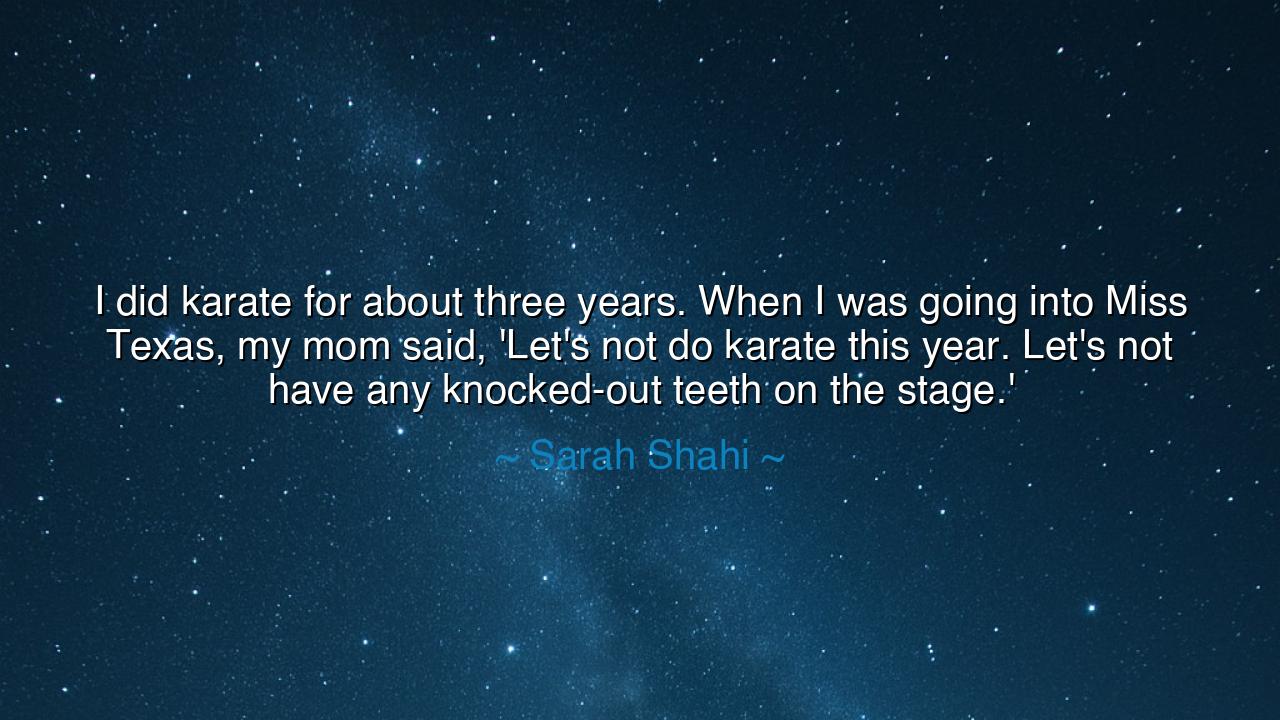
I did karate for about three years. When I was going into Miss
I did karate for about three years. When I was going into Miss Texas, my mom said, 'Let's not do karate this year. Let's not have any knocked-out teeth on the stage.'






The actress and storyteller Sarah Shahi once said with humor and grace: “I did karate for about three years. When I was going into Miss Texas, my mom said, ‘Let’s not do karate this year. Let’s not have any knocked-out teeth on the stage.’” On the surface, her words may seem playful—a light recollection of youth—but beneath them lies a timeless reflection on balance, discipline, and the art of knowing when to fight and when to yield. In her brief story, two worlds meet: the world of strength and the world of grace, the martial and the delicate, the warrior and the artist. Her mother’s wisdom, though spoken in jest, carries an ancient truth—that true power lies not only in the strike, but in the restraint that keeps one whole.
The origin of this quote springs from Shahi’s own life before fame, when she trained in karate—a discipline rooted in self-mastery, focus, and control. Later, as she prepared to enter the Miss Texas pageant, she found herself shifting from one form of expression to another, from the dojo to the stage, from sparring to poise. Her mother’s advice to “not do karate this year” was not a denial of her strength, but an acknowledgment that life often calls us to adapt—to temper our fire when grace is needed, and to guard our strength for the right arena. What sounds like a mother’s practical warning about “knocked-out teeth” is, in truth, a lesson in the harmony of opposites.
In the ancient traditions, this wisdom is echoed again and again. The philosopher Lao Tzu wrote that the softest things in the world overcome the hardest. Water, gentle and yielding, wears down stone. Likewise, the warrior learns that power without gentleness becomes destruction, while gentleness without strength becomes fragility. The balance between the two—the fist and the flower—is the mark of mastery. Sarah’s mother, whether she knew it or not, spoke as one of those sages: reminding her daughter that there is a time for battle and a time for beauty, a time for striking and a time for shining.
Consider the story of Miyamoto Musashi, the great samurai and author of The Book of Five Rings. In his youth, he fought recklessly, chasing victory in every duel. But in his later years, he withdrew from violence to seek wisdom, painting and meditating beneath the mountains. He discovered that the same spirit that guided the sword could guide the brush—that strength and serenity were not enemies but reflections of one truth. In this way, he became not just a warrior, but a master of balance. So too does Shahi’s story remind us that our lives require both forms of strength: the kind that defends, and the kind that endures.
Her mother’s voice, playful yet wise, represents the protective love that sees beyond the moment’s passion to the longer path of purpose. In telling her daughter to pause her training, she was not dimming her spirit, but preserving her radiance. It is the nature of love to guard what it treasures, to ensure that the strength one builds in youth does not turn inward as harm. Many have fallen not because they were weak, but because they failed to recognize when their strength should rest. In this, her words echo the counsel of countless elders who have said, “Choose your battles wisely, and remember that victory is not always won by the sword.”
The lesson here is subtle yet profound: do not think of power and gentleness as enemies, but as partners in the same dance. The true warrior knows when to fight, and the true artist knows when to protect her art. Life will ask you to be both—the one who defends and the one who dazzles. There will be times when you must strike against injustice, and others when you must simply smile, stand tall, and embody peace. Wisdom is knowing which time has come.
So, my child, remember the laughter within Sarah Shahi’s words, for they conceal deep truth. When your strength grows, learn to govern it; when your beauty shines, learn to protect it. Be fierce when the moment calls for courage, and gentle when the world asks for grace. For life, like karate and the stage, is not won by force alone—it is lived fully by those who can adapt, balance, and harmonize the many faces of their power.
Thus, in the humor of a mother’s advice, there lies the eternal counsel of the ages: that the highest strength is not in constant motion, but in mastery of one’s self. The warrior must learn to rest the sword; the performer must guard her smile. And those who learn to do both will walk through the world undefeated—not because they fought every battle, but because they understood the wisdom of choosing when not to.






AAdministratorAdministrator
Welcome, honored guests. Please leave a comment, we will respond soon